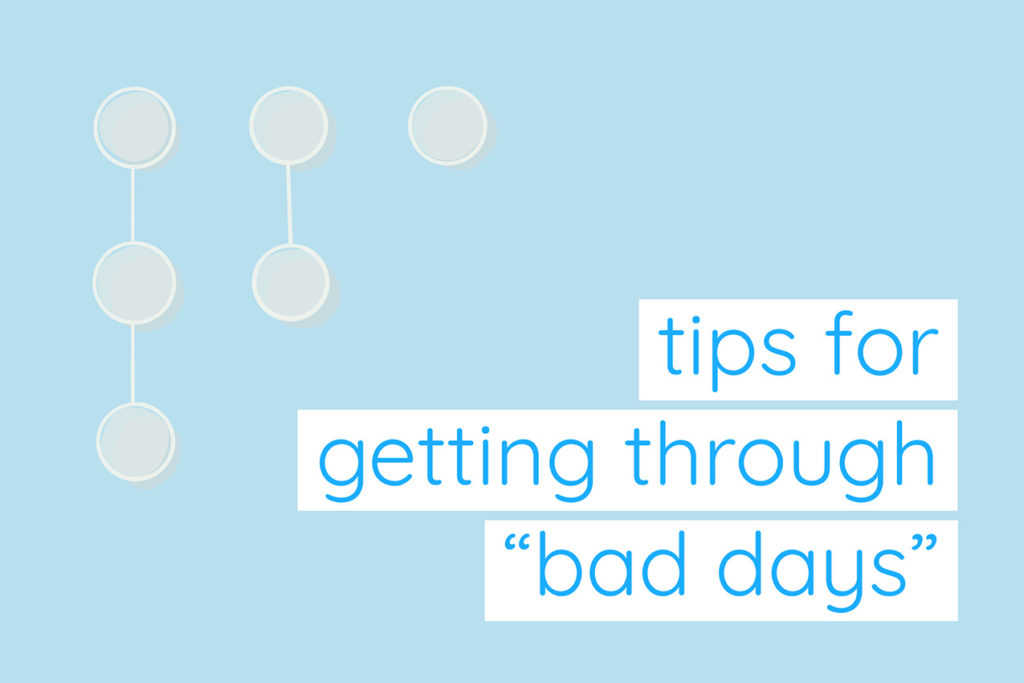Tips to help you get through “bad days”
by Roamers Therapy | September 2020
You may not be able to turn a bad day to a good one all the time, but you may be able to get through it a bit easier with a few mental tools. Below you will find some tips on how to see your “bad days” from a different perspective.
Things to remember when having a rough day:
- One negative experience does not have to influence how the remainder of your day will be like. We can sometimes send our minds into a trap of negative thinking after a bad start to our days. For example, if the coffee we just finished making falls on the floor, we may get upset and start to believe our entire day ahead will be a wreck. Remind yourself that you are human and mistakes happen.
- Be mindful of your self-talk. Language frames beliefs. For instance, telling ourselves we are having a “bad day” may inadvertently make us believe there is no room for any “good” outcome. Encourage yourself to say that it was only one negative thing, but your day was not entirely bad. Maybe use words like “rough” or “unpredictable”.
- The day will always end and so will your “bad day.” It is tempting to extrapolate a bad experience and start to believe that this one “bad day” will continue to happen recurrently. It is always good to remember that we have full control over our behaviors and emotions, meaning that if something doesn’t occur the way we want them to, we can choose to not let this experience bring us down.
- Practice self-care. This can look like really anything that finds you joy and/or simply helps you to wind down from the day you had: a well-deserved nap, making/ordering your favorite meal, watching a movie, spending time with loved ones, or sitting around and doing nothing at all.
- Ask yourself what this “bad day” is teaching you. In the heat of the moment, we don’t usually ask ourselves what a “bad day” may be teaching us, but there is always room for learning and growth. For example, if you started off on the wrong foot because you woke up late and then spilled your coffee, this could possibly be teaching to set an extra alarm and not hit snooze the following day.
- It’s okay to feel your feelings. This one may be a given, but sometimes in the midst of a rough time, we want to just not feel bad anymore. It is important to know that it is okay to feel frustrated, mad, upset, or sad and even more okay to let those feelings out by crying, if you feel like it.
- You aren’t alone. Knowing that bad occurrences and bad days have happened to everyone at least once or twice is important to remind yourself because you are only human. Not everything happens the way that we have planned for that day, however, we can at least use this fact to help soothe ourselves.
Reflect on the following question: What are some ways you can start to train your mind to challenge negative occurrences and help prevent the belief that your whole day is “bad”?
At Roamers Therapy, our psychotherapists are here to support you through anxiety, depression, trauma and relationship issues, race-ethnicity issues, LGBTQIA+ issues, ADHD, Autism, or any challenges you encounter. Our psychotherapists are trained in Cognitive Behavioral Therapy, Dialectical Behavioral Therapy, Psychodynamic Therapy, Acceptance, and Commitment Therapy, Person-Centered Therapy, and Gottman Therapy.
Whether you’re seeking guidance on a specific issue or need help navigating difficult emotions, we’re ready to assist you every step of the way.
Contact us today to learn more about our services and schedule a session with our mental health professionals to begin your healing journey. To get started with therapy, visit our booking page.
First, decide if you’ll be paying out-of-pocket or using insurance. If you’re a self-pay client, you can book directly through the “Book Now” page or fill out the “Self-Pay/Out-of-network Inquiry Form.” If you’re using insurance, fill out the “Insurance Verification Form” to receive details about your costs and availability. Please let us know your preferred therapist. If your preferred therapist isn’t available, you can join the waitlist by emailing us. Once your appointment is confirmed, you’ll receive intake documents to complete before your first session.
This page is also part of the Roamers Therapy Glossary; a collection of mental-health related definitions that are written by our therapists.
While our offices are currently located at the South Loop neighborhood of Downtown Chicago and Lakeview on Chicago’s North Side, Illinois, we also welcome and serve clients for online therapy from anywhere in Illinois and Washington, D.C. Clients from the Chicagoland area may choose in-office or online therapy and usually commute from surrounding areas such as River North, West Loop, Gold Coast, Old Town, Lincoln Park, Rogers Park, Logan Square, Pilsen, Bridgeport, Little Village, Bronzeville, South Shore, Hyde Park, Back of the Yards, Wicker Park, Bucktown and many more. You can visit our contact page to access detailed information on our office location.

